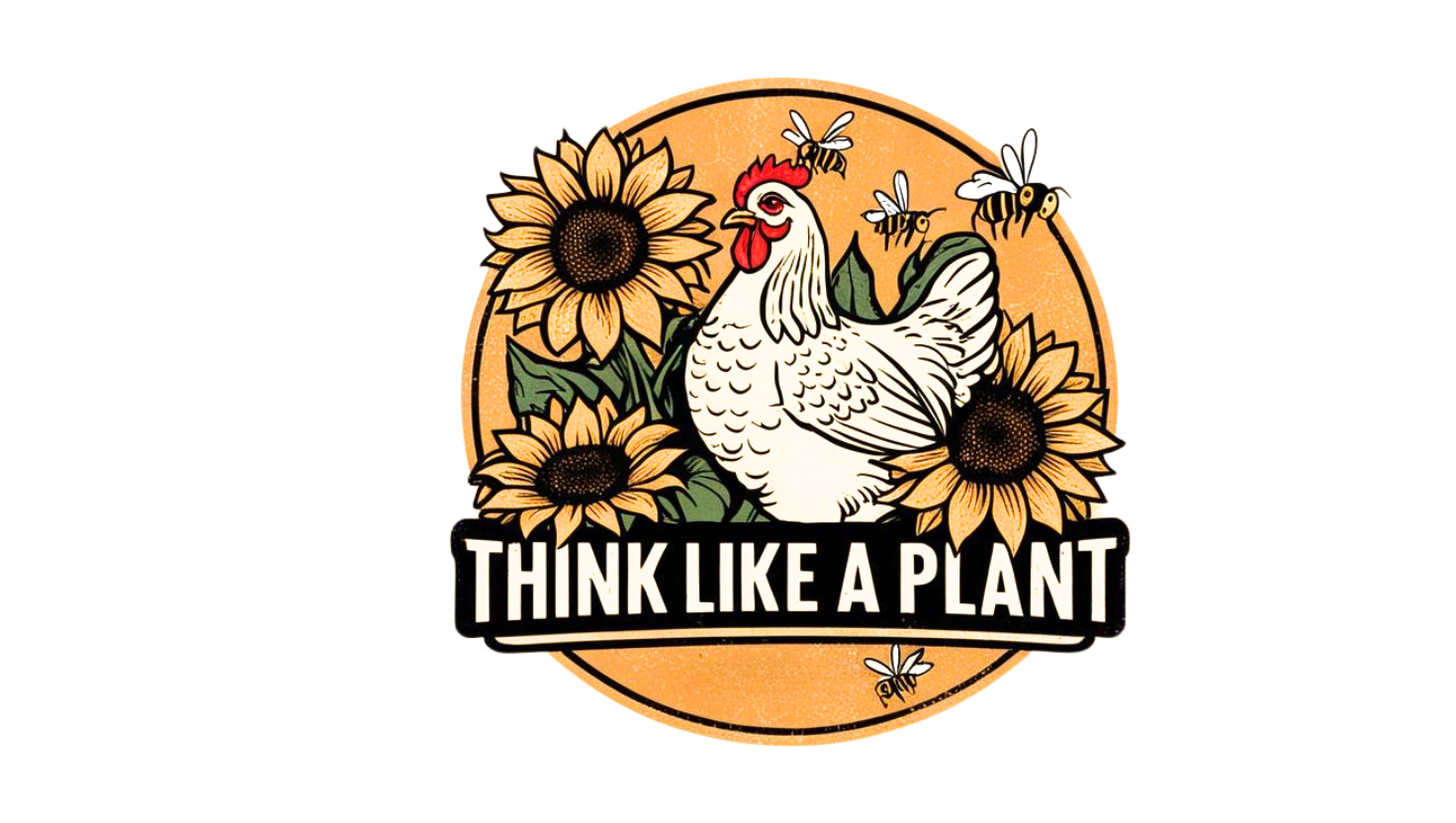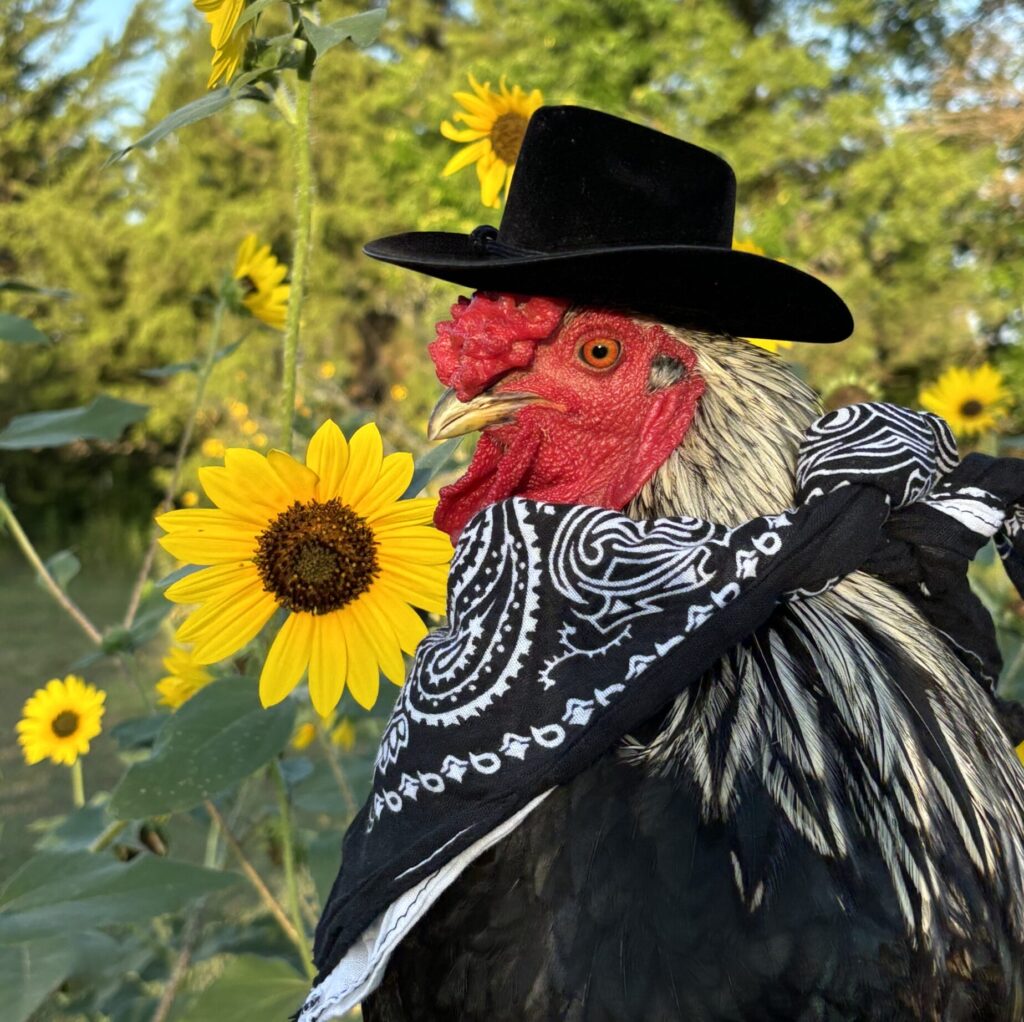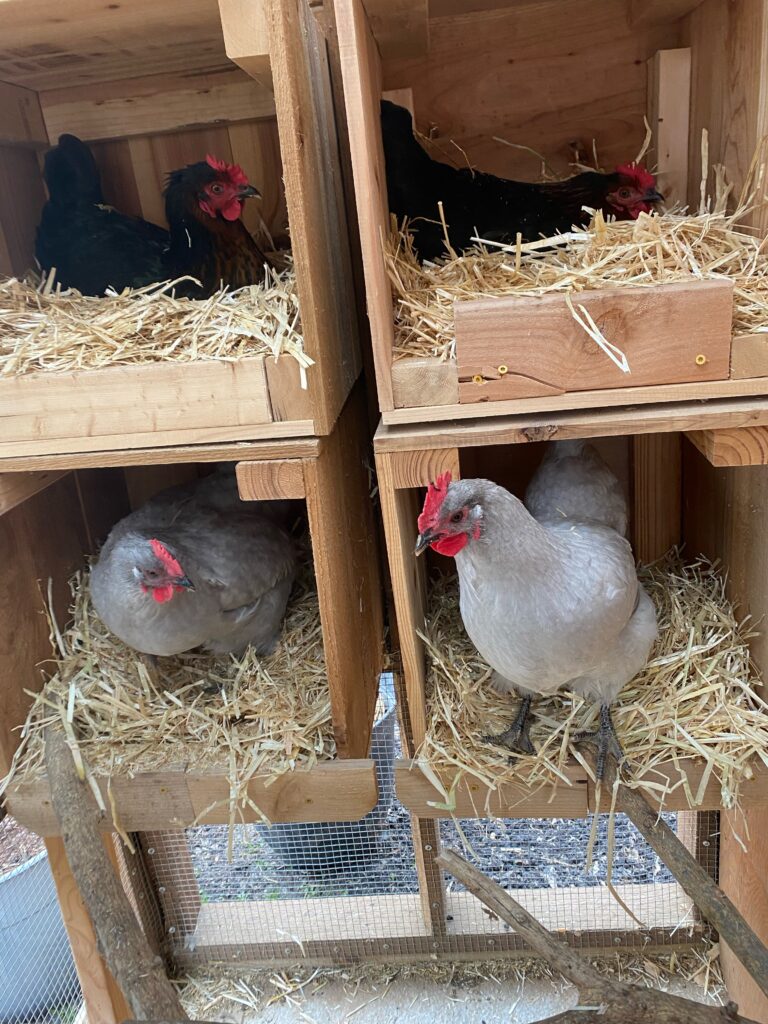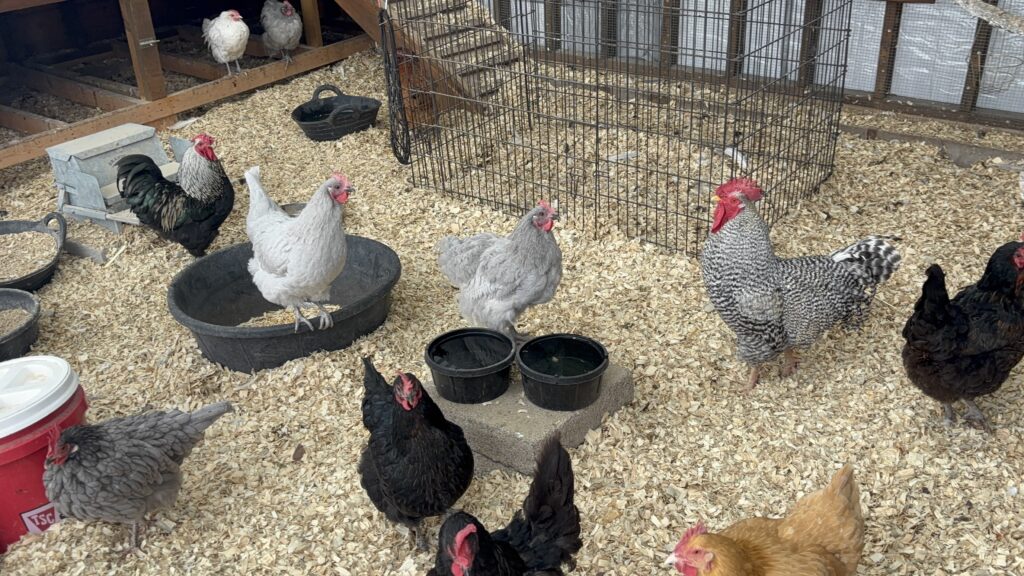“Rooster Rumble: Weighing the Benefits and Drawbacks of Adding a Feathered Leader to Your Flock!”
Purchasing items through the links provided in my blog is a way to help me earn a small commission at no extra cost to you. All links are located at the end of this post! Thank you so much for your interest and support!
Introduction
When it comes to raising chickens, many enthusiasts battle with the decision of whether or not to include a rooster in their flock. While others have the idea that a rooster is needed for hens to lay eggs, so they omit their desire to raise backyard chickens altogether. To clear that myth up, you do not need a rooster for chickens to lay those farm fresh eggs you are aching to enjoy.
Roosters can bring a variety of benefits, as well as many downsides, depending on your specific circumstances and preferences. In this post, we’ll dive into the advantages and disadvantages of having roosters, helping you make an informed choice for your backyard or farm.
The Role of Roosters in a Chicken Flock
Firstly, let’s understand the role that roosters play in a flock. Roosters are male chickens, typically known for their impressive plumage, distinctive crowing, and protective instincts. In a natural setting, they serve as the guardians of the hens, helping to maintain social structure and protect the flock from potential threats.
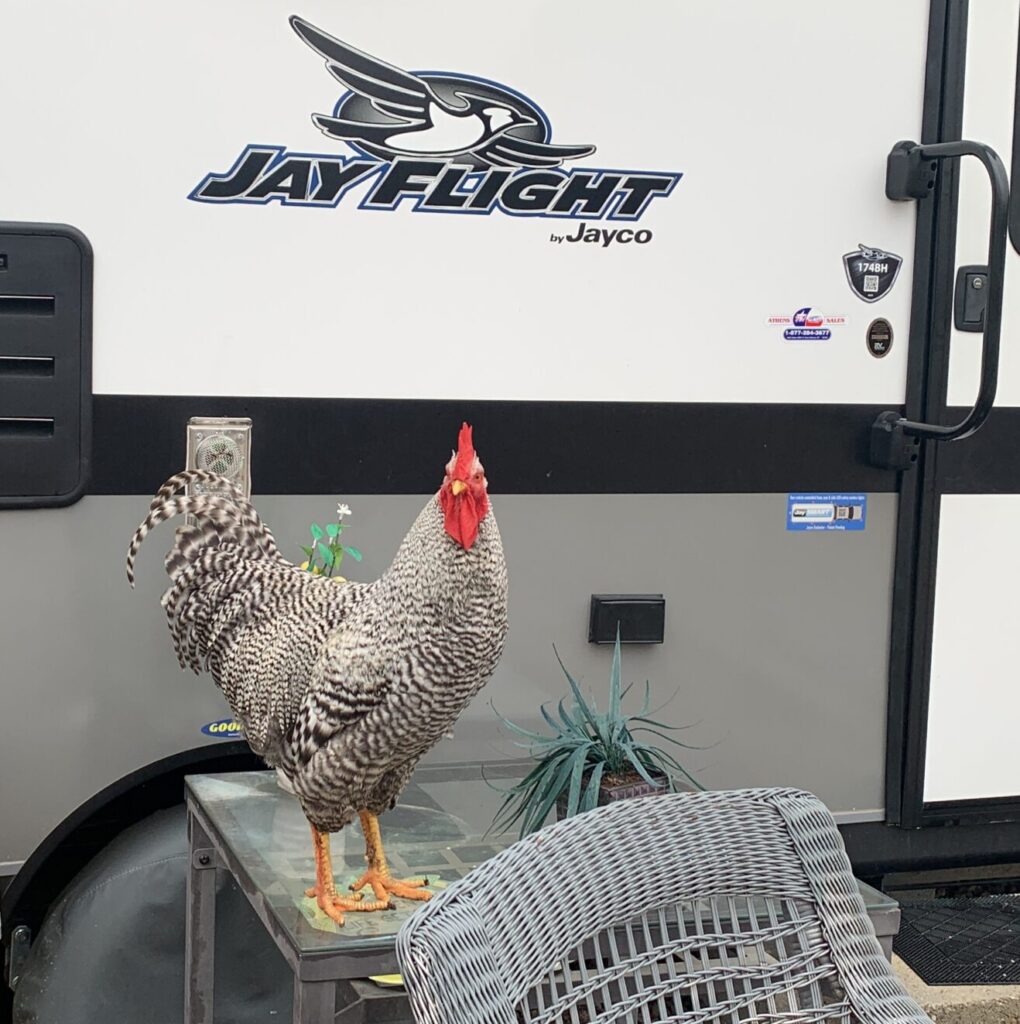
Pros of Having Roosters
Natural Breeding
One of the most significant advantages of keeping a rooster is the ability to naturally breed your hens. Fertilized eggs can lead to baby chicks, allowing you to expand your flock without buying new birds. If you’re interested in raising chicks and continuing your flock lineage, a rooster is essential.
Protection
Roosters are known to be very protective of their flock. They’ll often keep a watchful eye for potential threats, such as hawks, coyotes, dogs, humans and pretty much any other potential predator they view as a threat. Roosters will give their very own life for their ladies! With a rooster around, hens may feel safer, leading to a more stable environment. True story, a hawk once flew down so low, that our rooster flew up and karate kicked the air. It was a close call for that hawk!
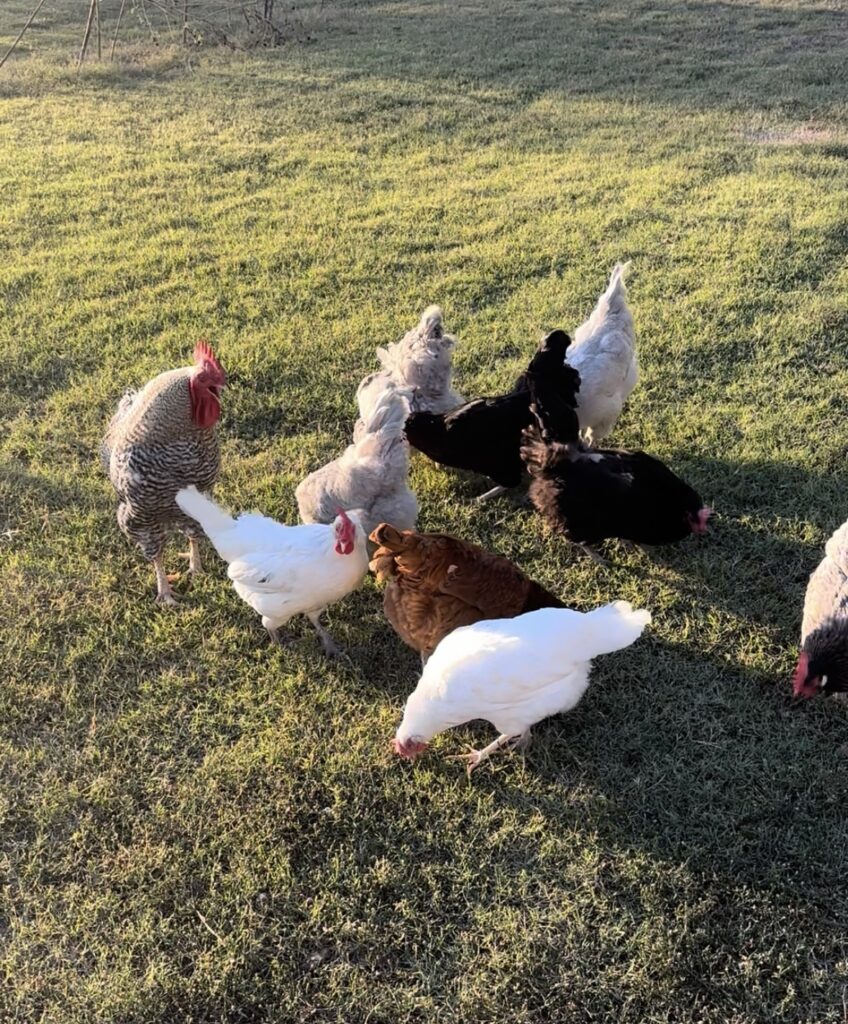
Behavioral Regulation
Roosters can help regulate the behavior of hens within the flock. They often establish a pecking order, which can prevent fighting and bullying among the hens. The presence of a rooster often promotes a more orderly social structure. When there is no rooster present in a flock, the strongest and the wisest hen will usually take the lead in the pecking order but you can imagine how much chaos there may be if you have a large flock of dramatic hens! No joke! It can get ugly!
Crowing at Dawn
For many, the crow of a rooster is an iconic sound of farm life. It marks the start of a new day and can be a charming addition to your routine. The crowing can also act as an alarm clock, reminding you to start your day early.
Enhanced Fertility
A rooster can increase the overall fertility of your flock. He encourages hens to lay more eggs, which can be beneficial if you’re looking to maximize production. Hens are often more productive when a rooster is present.
Roosters occasionally like to fix the nesting boxes for the hens, especially when new straw is added. He will go inside the box, scratch around, lay down and make a calling sound as if he is inviting and encouraging his hens to check out the new fluffy straw and lay more eggs. It’s adorable!
Genetic Diversity
Including a rooster in your flock can enhance genetic diversity, especially if you’re interested in keeping purebred chickens. By allowing a rooster to mate with hens, you can help maintain the breed’s characteristics and traits.
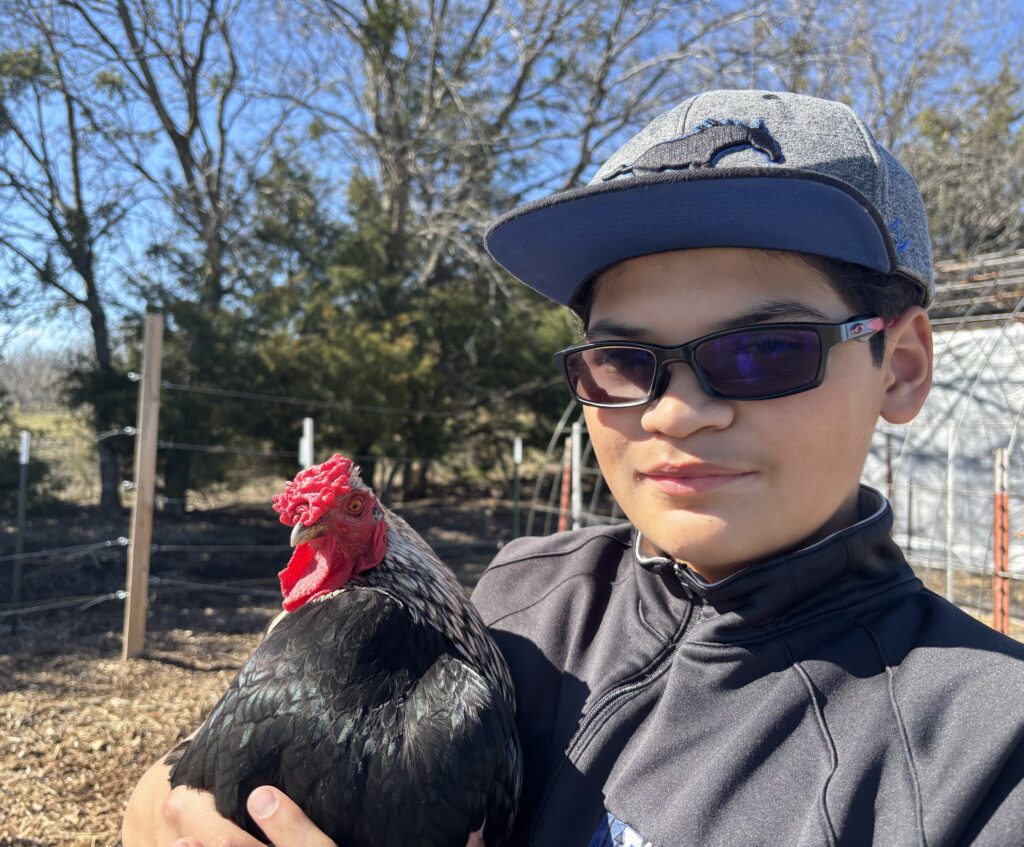
Aesthetics and Companionship
Roosters can be visually striking with their vibrant colors and unique feather patterns. They also add personality and character to your flock. Many chicken owners find joy in watching roosters as they exhibit their natural behaviors. As you saw in the first picture of our first rooster Hammy, we even dress him up for pictures!
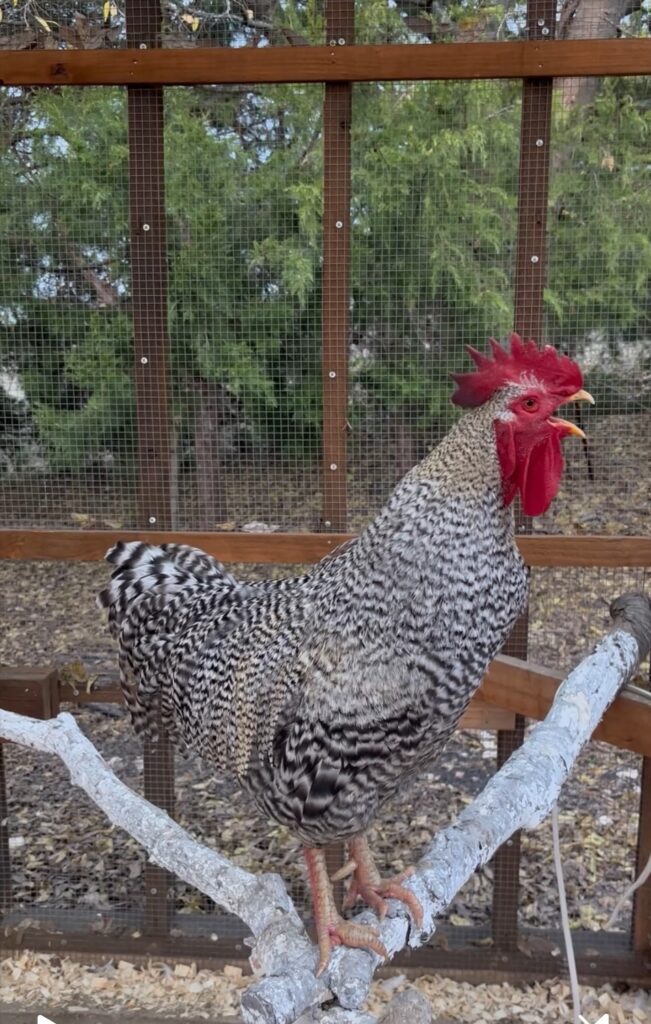
While there are several benefits to having a rooster, there are also valid concerns and downsides that need much consideration:
Crowing Noise
Roosters have a bad reputation for their loud, early morning crowing. The fact is that they don’t just crow in the morning but all day and even more if there are other roosters nearby crowing as well. For those living in urban or suburban areas, this can be a significant issue. Neighbors may not appreciate the noise, leading to conflicts or even local ordinances against keeping roosters. on the contrary, depending on where you live or who your neighbors are, you may be able to keep a rooster without a problem or complaint. Some people actually enjoy hearing a rooster’s crow!
My Story
I never intended to own a rooster at all and especially not two at once. I was living with my parents for about 4 months while my family found a new home and during that time, my father’s hen hatched 10 fertilized amazon chicken eggs. My son and daughter picked a chick and even though we told my son who was 10 years old at that time that if it was a rooster, we wouldn’t keep it. At 6 weeks old, Hammy let out his first crow and my son was happy and sad at the same time. He felt torn with the feeling of happiness because he always wanted a rooster, but at the same time cried because he new we would not be able to keep a rooster. Well, we gave in as parents and let him keep Hammy, thinking we would get reported by the neighbors. To our surprise, we didn’t get reported. There was another neighbor in the area with a rooster as well and there was no problem.
After finding our new home, we brought our rooster along with our hens and hoped we wouldn’t get reported by our neighbors as well. At this point, Hammy was part of the family, and because he was the nicest Rooster in the world, we didn’t want him to be taken away from us. I opted to buying him a crow collar to keep him somewhat quiet and while it worked, it broke my heart to see him jump backwards while he crowed. Finally, we let the crow collar go, and let him have a happy crowing life. No one was ever bothered by Hammy’s crow or Roost Wayne’s Crow for that matter! My neighbors are spaced out every acre or more so either that makes a difference for them or they are the best neighbors in the world!
Aggressive Behavior
Some roosters can exhibit aggressive behavior, particularly during mating season or if they feel threatened. This can pose a challenge for both owners, children in the family and other flock members. Aggressive roosters may attack and peck at hands or feet, which can be intimidating and painful.
My Story
In my family, we currently have had and only had 2 roosters with totally opposite personalities! Our oldest Hammy, being 4 years old this May 2025 was de-throned in 2024 by our second rooster Roost Wayne (barred rock) who is 1 year old. Roost Wayne was supposed to be a pullet (female chicken) when we bought him but turned out to be a male by mistake. We were unable to give him back so he stayed with the flock. He is the kind of rooster that steps into danger to fight and protect, while Hammy is more of the cautious rooster who alerts the hens of danger to seek shelter. Roost Wayne constantly chases Hammy away and doesn’t let him mate with the hens.
Although, Roost Wayne is great at protecting his hens, he is also constantly showing signs of aggression towards us. He starts pretending to eat grass or twigs to make you think he is busy but while he is eyeing you and you turn around or get close to him, he is more likely to throw a kick at you with his spurs. I just can’t trust him. He is also aggressive with the hens while mating. He runs and jumps on them forcefully, causing them pain and wounds. He is not the kind of rooster you are wanting to add to your flock! Don’t get a Barred Plymouth Rock Rooster!
Limited Space
If your chicken coop or run is limited in size, adding a rooster can create tension within the flock. Too many roosters in a close space can lead to fighting and stress among the birds. Maintaining a balanced rooster-to-hen ratio (generally 1 rooster for every 8-10 hens) is essential.
My Story
We don’t have to correct rooster-to-hen ration at this point, but we also don’t have the space in the chicken run for more hens. We do different things to keep the peace among the 10 hens and 2 roosters that we own. We have a large enough cage, to cage up the bully rooster during the morning time, until we let them forage on about an acre of land. This gives Hammy his space to avoid Roost Wayne. The trouble is during the nights. Hammy won’t go inside the sleeping coop because Roost Wayne chases him out. During the winter, this makes it extra difficult for my teen son and I to go every night and put Hammy in the sleeping coop so he doesn’t get cold. It really adds extra work to our chicken keeping routine.
Breeding Challenges
If you are not interested in raising chicks or dealing with the responsibilities of breeding, having a rooster can complicate things. Unwanted fertilization can occur, leading to potential conflicts in management. Don’t risk the fact that many of those baby chick eggs will hatch into roosters and then you are stuck with a rooster problem. You should have a back up plan for the roosters that do hatch! Sadly, many don’t even get the chance at living and are butchered so sometimes it’s best not to even take the chance of hatching baby chicks from the beginning.
Health Risks
Roosters can sometimes spread diseases that hens may not be able to manage. It’s crucial to maintain a healthy environment and monitor your flock closely. If one bird becomes ill, it can quickly spread to the others.
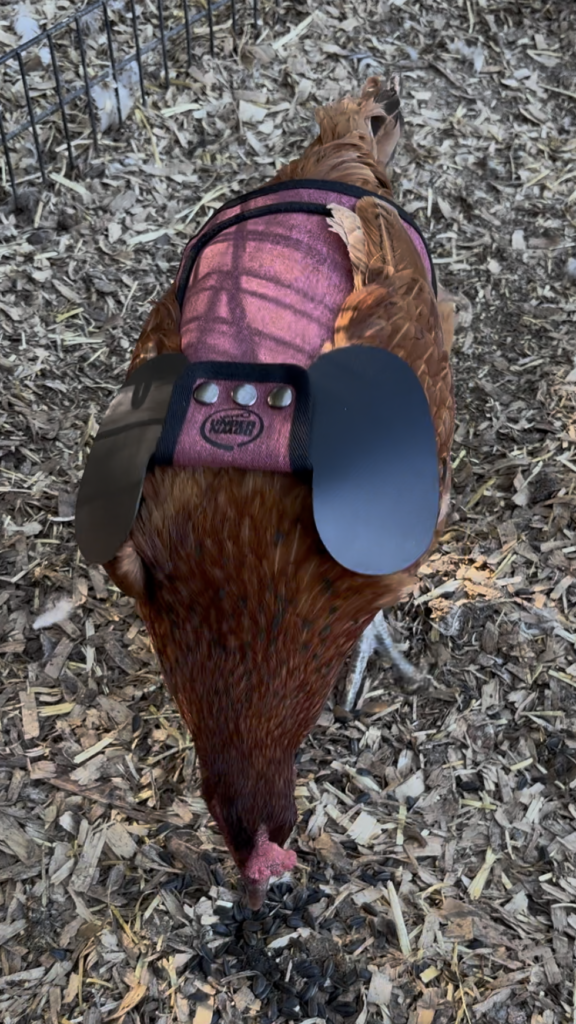
Inefficiencies in Egg Production
While a rooster may increase egg production in some cases, it doesn’t guarantee higher yields. In fact, some hens may stop laying eggs if they experience stress from a dominant rooster. It’s essential to consider the dynamics of your specific flock.
My Story
So, my dominant rooster Roost Wayne, has been aggressively mating with my hens during this spring mating season. In particular, there are 3 hens that he favors over the rest. Not to mention, he chooses the skinnier hens and damages them with his big body and spurs. I am by far, tired of him damaging the ladies, so he is on restrictions at this point. He is to be caged up until they heal, he will have foraging privileges but without the hens. He will have to take turns with the girls foraging, in return of the hens healing the punctures and gashes they have under their wings and while they grow their feathers back. Sometimes, I just want to get rid of him but may factors keep me from doing so.
Legal Restrictions
Depending on where you live, there may be laws against keeping roosters. Always check your local regulations before adding a rooster to your flock to avoid fines or the need to re-home your bird.
Re-homing a rooster is not that easy and sadly, most of them get a free trip to the chop cone. There are a few places that will take your rooster under certain circumstances and for a rehoming fee. Try posting him on your local neighborhood app to see if anyone is willing to take him for their flock. Maybe someone doesn’t have regulations or has a larger flock in an open area that may need a protective rooster to take the lead. Others, may just say they will take him for a great chicken soup. Whatever you do is your choice and there isn’t that very many options to be honest.
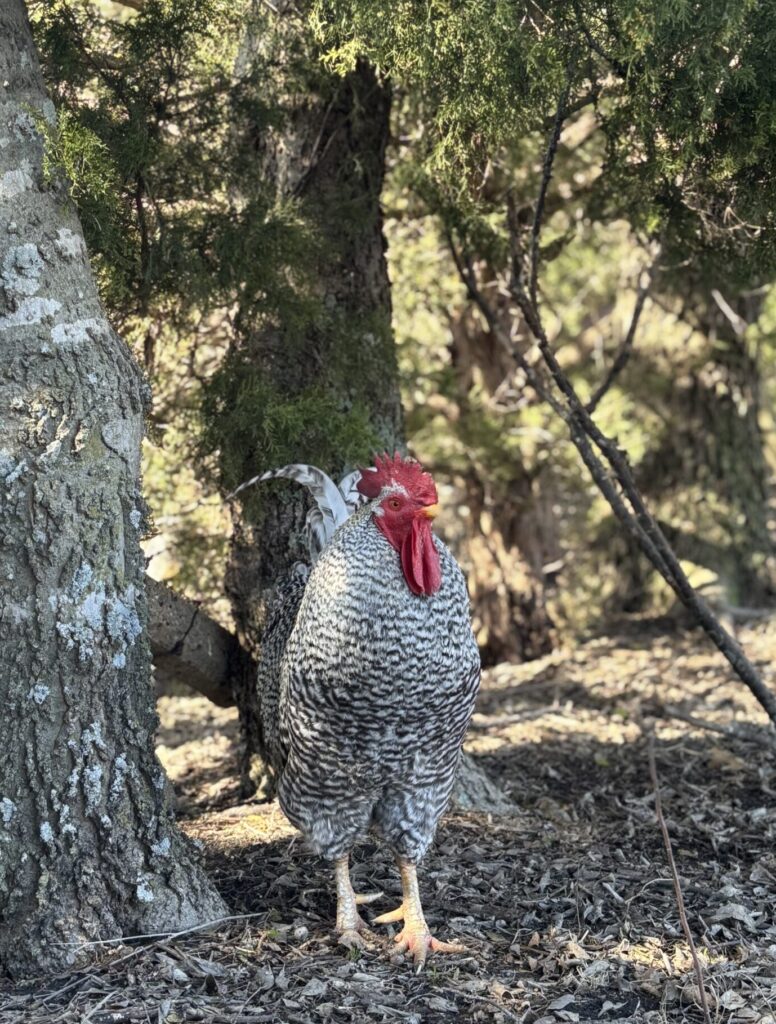 Making an Informed Decision
Making an Informed Decision
Ultimately, the decision to include a rooster in your chicken flock should be based on your specific circumstances, preferences, and living environment. Here are some tips to help you decide:
– Assess Your Space: Ensure that you have enough space for both hens and a rooster. A larger coop and run can help reduce stress and potential aggression.
– Consider Your Neighbors: Think about how your rooster’s crowing may affect your neighbors. If you live in a densely populated area, it might be best to forgo a rooster.
– Know Your Goals: If you’re interested in breeding, a rooster is a must. However, if egg production is your primary goal, you don’t need one.
– Monitor the Flock Dynamics: If you decide to add a rooster, be observant of how he interacts with the hens. If aggression or stress occurs, you may need to make adjustments or rethink your choice.
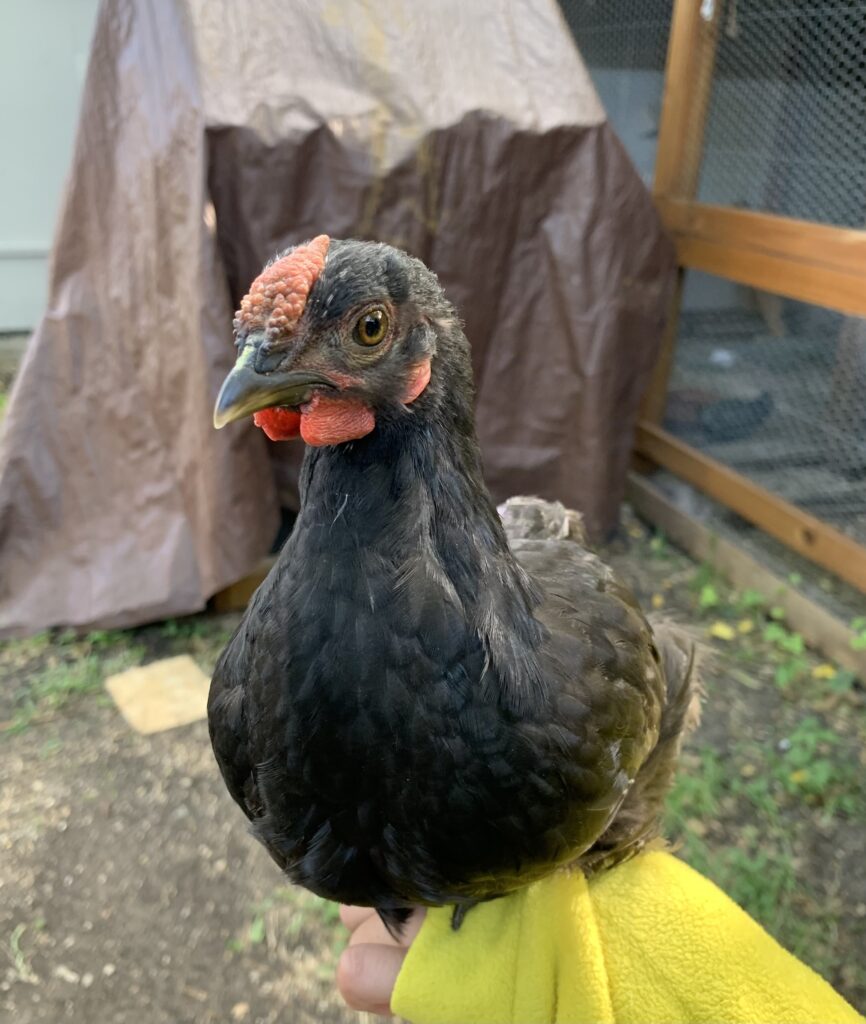
Conclusion
Having a rooster in your chicken flock can be both rewarding and challenging. From providing protection and enhancing social structure to the potential for noise and aggression, there are numerous factors to consider. By weighing the pros and cons, you can make a decision that best fits your goals and living situation, creating a happy and harmonious environment for both your chickens and yourself. As with any animal husbandry decision, thoughtful consideration, and preparation will lead to a more enjoyable and fulfilling experience in raising chickens.
Affiliate Links
Using my links will help me gain a small commission at no extra cost to you. Thank you for the support!
